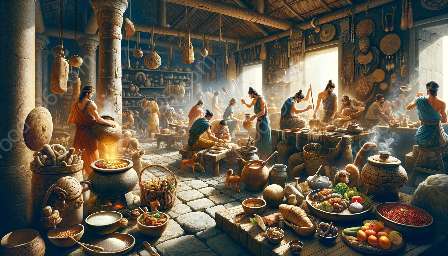Indian culinary arts in ancient civilizations have a rich and diverse history that reflects the cultural, social, and geographical influences in the region. The cuisine of ancient India was a blend of various traditions, techniques, and ingredients, resulting in a unique and delightful gastronomic experience.
The Birth of Indian Culinary Arts
The roots of Indian cuisine can be traced back to ancient civilizations such as the Indus Valley, Vedic, and Mauryan periods. These early civilizations laid the foundation for the development of Indian cooking techniques, food culture, and traditions. The ancient Indian culinary arts were shaped by the availability of local ingredients, such as rice, wheat, lentils, vegetables, and spices, which were used to create a diverse range of dishes.
Influences and Innovations
Ancient Indian culinary arts were greatly influenced by trade, invasions, and migrations, leading to the assimilation of new ingredients and cooking methods. The arrival of the Aryans, Persians, Mughals, and Europeans introduced a variety of new spices, herbs, and cooking styles, which further enriched and diversified Indian cuisine.
The development of Ayurveda, an ancient Indian system of medicine and lifestyle, also played a significant role in shaping the culinary practices of ancient India. Ayurveda emphasized the use of natural and wholesome ingredients, as well as the balance of flavors and nutrients, which continue to be fundamental principles in Indian cooking today.
Diverse Regional Flavors
Indian culinary arts in ancient civilizations were not limited to a single style or flavor profile. Each region of ancient India developed its own distinct culinary traditions, influenced by local ingredients, climate, and cultural practices. The cuisine of Northern India differed from that of the South, with unique spices, cooking methods, and flavor combinations.
The Role of Food in Ancient Indian Culture
Food held a central place in the social, religious, and cultural life of ancient India. The concept of hospitality, communal dining, and food offerings to deities played a significant role in shaping the food culture and traditions of ancient India. Festivals, rituals, and daily meals were occasions for the preparation and consumption of a wide variety of dishes, each with its own symbolic significance.
Legacy and Influence
The culinary arts of ancient India have left an indelible mark on the modern Indian cuisine and culinary practices. The use of spices, complex flavor profiles, vegetarian cooking, and diverse regional specialties continue to be hallmarks of Indian culinary traditions, reflecting the enduring legacy of ancient civilizations.

